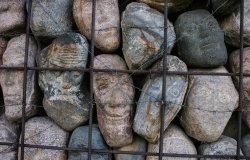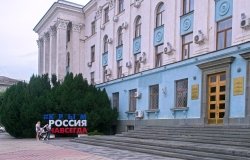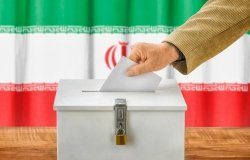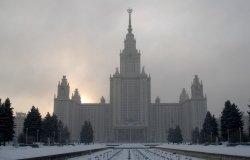Is There Any Hope for Pakistan's Shias?
Remarks made by Michael Kugelman at a February 24 conference on the world's Shia Muslims.
The following presentation, entitled "Is There Any Hope for Pakistan's Shias?" was delivered by Michael Kugelman at a February 24 conference called "The Role of Education in Implementing Social Justice: The Case of Shias Muslims." The event was organized by Shia Rights Watch and American University, and held on the main campus of American University.
Good afternoon all. I’d like to thank Shia Rights Watch for inviting me to speak at this conference, which is so important for all the wrong reasons, given the troubled plight of the Shia in so many parts of the world. I’d also like to thank AU for hosting.
I’ll be talking about Shias in Pakistan. They constitute about 20 percent of Pakistan’s 180 million people. Pakistan is arguably one of the deadliest countries for Shias outside the Middle East. What’s particularly alarming is the rate of increase of Shia deaths in Pakistan in recent years. In 2012, at least 325 were killed. Last year, nearly 400 were. More and more commentators in Pakistan are now using the word “genocide” to describe their plight.
My comments will focus on the grim situation of Shias in Pakistan—a chief victim of the sectarian violence that, in my view, poses Pakistan’s greatest security threat. However, I will also identify some reasons for hope, and highlight some of the heroic efforts being made in Pakistan to curb sectarian violence against Shias.
Let me first highlight three reasons why Shias face such a grim situation in Pakistan, and why sectarian violence is such a big security threat. First is sectarian militancy’s broad reach. One of its most powerful practitioners, a terrorist organization called Lashkar-e-Jhangvi (LeJ), has staged attacks in all four Pakistani provinces—something that few, if any, other Pakistani militant groups have done. LeJ gets plenty of help from the Pakistani Taliban, is increasingly targeting religious minorities and has claimed responsibility for a number of recent sectarian attacks. These tactics suggest a growing alliance between two of Pakistan’s most fearsome Sunni extremist organizations.
The second reason to fear for Shias in Pakistan is, quite frankly, public opinion. Few Pakistanis embrace the anti-state Pakistani Taliban’s vision of destroying the country’s political system, but many sympathize with the underlying views of sectarian extremists. In a recent Pew poll, 41 percent of Pakistanis said that Shias are not Muslims. In another poll, 60 percent of Pakistani youth contended that Ahmadis—who belong to another minority sect of Islam—are not Muslims. Punjab province governor Salman Taseer was assassinated in 2011 for his public opposition to Pakistan’s so-called blasphemy laws, which are often used to persecute religious minorities including Shias. Scores of Pakistanis—including many lawyers—rallied in support of Taseer’s assassin, at one point showering him with roses as he made his way to court. By expressing support for the basic ideas fueling sectarian violence, Pakistanis indirectly confer legitimacy on sectarian militants’ activities.
And the third and final reason why the plight of Shias in Pakistan is so alarming is that the Pakistani state has institutionalized sect-based discrimination. The second amendment of Pakistan’s constitution explicitly states that Ahmadis are non-Muslims. Not surprisingly, Pakistan has few laws that protect religious minorities—yet it does have the blasphemy laws, which produce the opposite effect. The assassination of Taseer has silenced much of the policy debate about religious minorities, and has made reform of the blasphemy laws—much less their elimination—a political nonstarter.
The most troubling aspect of the state’s complicity in sectarianism is the nexus between sectarian extremists and the security establishment. Human-rights groups believe Pakistan’s intelligence agency, the ISI, leverages these organizations to take on separatist insurgents in Balochistan province. There are also links between sectarian fighters and the Pakistan Muslim League-Nawaz (PML-N)—the political party that has long run Punjab’s provincial government, and now leads the central government. In 2011, Punjab’s law minister admitted his government provided financial assistance to the family of LeJ’s supreme leader, Malik Ishaq. In 2012, he campaigned with the leader of Sipah-e-Sahaba, LeJ’s parent organization. Given that the PML-N’s bastion in Punjab is also the stronghold of most sectarian extremist groups, such linkages, while disturbing, are unsurprising.
Predictably, sectarian militants operate with impunity in Pakistan. Ishaq, the LeJ leader, lives freely in Punjab (he is periodically detained, before being promptly released). Suspects are rarely arrested, much less prosecuted. In 2012, after tombstones at Ahmadi cemeteries were desecrated, police took no action. In many cases, police refuse to come to the aid of victims. After a mob set fire to homes in a Christian neighborhood of Lahore this year, a report produced by Pakistan’s Human Rights Commission concluded that police had been aware of an arson threat in advance, yet neither preempted the attack nor sought to save the homes. Last month, according to media reports, as Christian women were paraded naked by an armed mob, police arrived only “after much time”—and offered little assistance. Later, a PML-N legislator ordered police to back off because the perpetrators supported his party.
So the Shia in Pakistan can’t expect much support from the PML-N-led government. It’s not like they enjoyed much support from Pakistan’s previous government, led by the Pakistan People’s Party (the party of the late Benazir Bhutto), though research has shown that Shias in Punjab have voted for the PPP as far back as the 1990s, because of the perception that it is more liberal and tolerant of religious minorities than are other parties). One might ironically assume that the Shias would get the most support from the Tehreek-e-Insaf Party (PTI), a conservative party led by ex-cricketer Imran Khan. The PTI, more so than the PML-N or PPP, has gone out of its way to condemn the country's sectarian bloodshed and its chief instigators. After an LeJ bombing killed nearly 90 people in a Quetta market last year, Khan declared at a press conference: "I tell you by name, Lashkar-e-Jhangvi...there can be no bigger enemy of Islam than you." He also accused the LeJ of exhibiting "the worst kind of enmity towards Islam." Such strong language is rarely used by the PPP or PML-N. Khan has even endorsed Shia demands for targeted operations against religious militants.
The PTI is not in the governing coalition, though it does run the province in Khyber-Pahktunkhwa bordering Afghanistan. Still, it’s important to emphasize that the PTI has no plans to take aim at the root causes of sectarian violence. For example, reforming-much less repealing-Pakistan's blasphemy laws is a move no political party in Pakistan dares make. Also, many Shias are suspicious of Imran Khan because of his support for talks with the Taliban and other gestures perceived as sympathetic to religious militants. Such suspicions intensify when high-ranking PTI officials share the stage with hardline Islamist figures- during rallies of the Pakistan Defense Council, a collective of conservative religious parties. A recent video produced by the Shia rights group ShiaKilling.com captures the contempt that Pakistani Shias harbor toward the PTI (and toward the PML-N as well). One Shia cleric (who admittedly does not appear to enjoy a large following) has even peddled an elaborate conspiracy theory involving Saudi Arabia and the ISI colluding to install Khan as the leader of a new "Saudi-Wahhabi Islamic State" of Pakistan.
Not surprisingly, Shias in Pakistan have taken matters into their own hands and mobilized politically. Before last year’s national election, a collaborative of Pakistani Shia religious scholars announced that the establishment of a Shia Solidarity Council "to promote harmony" among the country's Shias. It even registered as a political party, and contested elections, though it didn’t do particularly well, given its lack of resources and given the general tendency of Pakistani religious parties to fare poorly in elections.
Still, there is some reason for hope. Pakistanis are doing things to help Shias and other besieged minorities. I want to briefly highlight the contributions of three heroic Pakistanis; I had written about these three in an article for Foreign Policy several months ago. These are Pakistanis who not only deplore sectarianism, but have also taken dramatic steps to combat it (one of them lost his life for his efforts). Most critically, their countrymen have supported them.
First, Zahid Iqbal.
On the outskirts of Islamabad stands an extraordinary structure: Pakistan's first sect-free mosque. Zahid Iqbal is the businessman behind it. "We don't belong with any sect of Islam," he told the Associated Press this summer. "We only belong to Islam."
The mosque's main prayer hall can accommodate 350 people. It also holds an inter-sect religious library, and will soon open a women's section. A welcoming sign proclaims a message of tolerance: "This mosque does not discriminate between any sects and welcomes all Muslims."
Iqbal has dispatched mosque officials to other mosques, where they preach messages of tolerance and unity. He has told me that he eventually plans to establish branches of the mosque elsewhere in Pakistan. "To me, Islam means Mercy, that is to do good to others," he said in an email. "So, through this mosque I am trying to live up to this message of Islam."
Second, Jibran Nasir.
Last fall, soon after more than 100 Christians were killed in an attack on their church in Peshawar, Christians and Muslims formed human chains around churches in several major Pakistani cities. Participants included muftis, Christian clergy, women, and children, and they displayed banners that proclaimed: "One Nation, One Blood."
This campaign was led by Jibran Nasir, a Pakistani lawyer and activist who works for an organization called Pakistan for All. "The terrorists showed us what they do on Sundays," he declared at an event in Lahore. "Here we are showing them what we do on Sundays. We unite." The intention, he told me, is "to send out a message that every house of God whether a church, temple or synagogue is as sacred as a mosque and hence protection of these places of worship is the responsibility of every Muslim." He says he was inspired by the human chains formed by Muslims to protect Coptic Christians praying in Egypt, another nation where religious minorities are often persecuted and attacked.
Nasir, who has also organized assistance for Shi'a victims of sectarian attacks, recently ran as an independent for a National Assembly seat representing Karachi. In official campaign videos and media interviews, he constantly condemned sectarianism. He also campaigned for Ahmadi rights -- a nearly unfathomable cause for Pakistani politicians to take up. Ultimately, he wasn't elected, but he vows to run again.
Third, and most tragically, Ghulam Mustafa.
Last August, extremists boarded a bus in Balochistan and killed more than a dozen Shi'as. They also gunned down Ghulam Mustafa, a Sunni passenger who dared to confront them. "Why are you doing this?" the 19-year-old student reportedly said to the gunmen. "Why do you want to kill these people? Islam doesn't allow the killing of innocent people." Shortly thereafter, Mustafa was led to the side of the road and executed alongside the Shi'a bus riders.
While these three young men have fought sectarianism directly, they have also had supporting casts -- the staff that run Iqbal's mosque and guide its worshipers; the participants in Nasir's human chain campaign; and several other Sunni bus riders who, like Mustafa, refused to identify Shi'a passengers (according to several media accounts, two other Sunnis died along with Mustafa).
Such support extends across Pakistan more broadly as well. Iqbal told me that his mosque has not received a single threat, and that the overall response has been "encouraging and supportive." Meanwhile, Nasir told me that his advocacy has generated ample support from numerous religious scholars. He has also revealed that three major political parties invited him to join their ranks -- and continued to offer advice and support even after he declined.
I was struck by the responses I got to the article about these three men. Everyday Pakistanis contacted me and told me that these guys are heroes, and that they wish they could do what these men had done. Interestingly, I heard from an organization of retired servicemen, who told me they’ve been providing private security at besieged churches when the state refuses to do so.
More recently, after attacks on Hazara Shias earlier this year, I heard stories of common Pakistanis converging on hospitals where the wounded were, to offer support, gifts, and candy. These Pakistanis were not necessarily Shias themselves.
So clearly, sectarian tolerance has a constituency in Pakistan. To be sure, it's a relatively small constituency, but it is one worth highlighting. For it to get larger, there needs to be more awareness of the plight of Shias in Pakistan—and for that, there needs to be more informational exchange and education, the very themes of today’s conference. Thank you.
Related Program

Indo-Pacific Program
The Indo-Pacific Program promotes policy debate and intellectual discussions on US interests in the Asia-Pacific as well as political, economic, security, and social issues relating to the world’s most populous and economically dynamic region. Read more










